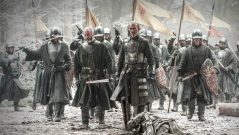These days it takes a medieval fantasy to help us remember why liberal democracy is worth cherishing.
The Philosophy of Governance in Game of Thrones
The HBO television show Game of Thrones, based on the books by George R. R. Martin, has begun its fifth season. Martin wrote the books in part based on the concern that J. R. R. Tolkien had focused on the war against evil and had neglected the difficulties of governing. Martin’s books focus on the latter.
I know my Game of Thrones mainly from the television show rather than the books (although I have read the first book). So it is always possible that my thoughts here might turn out to be inconsistent with later developments in the books.
(Spoiler alert: the following post assumes that you have finished the fourth season of Game of Thrones. If you have, it is safe to read.)
My view is that Martin believes that desirable governance is something of a golden mean between two extremes. On the one hand, there is the philosophy of governance of the Starks – Ned and his eldest son, Robb. Both of these leaders are admirable men in a way – they are mainly honorable and seek to follow moral norms. Yet disaster befalls both of them. Ned is killed largely because he does not act strategically or decisively, warning the Queen and allowing her to act against him. As a result, his family is devastated.
Robb, too, is an honorable man and leader. Yet, in the end, he and his mother and his followers are destroyed because of his honor and naiveté. He orders his army to abandon strategic positions to attend a funeral and he executes one of his important lieutenants who has acted wrongly, resulting in the loss of half of his army. He does break a promise to another leader, seemingly a dishonorable act, but he does so out of true love. But then his naiveté leads him to trust that leader, who slaughters him. Thus, honorable and nonstrategic leaders are a bad deal in Martin’s world.
At the opposite extreme are leaders who are strategic and conniving, but are mean and are willing to make enemies of those they regard as beneath and unable to harm them. These are the despicable characters – the three Lannisters – Joffrey, Tywin, and Circe. Joffrey gets killed because a powerful lady regards him as a moral abomination. Tywin is killed at the hand of his son who takes revenge against Tywin’s outrageous parental behavior. Both Joffrey and Tywin don’t believe they will be harmed for their actions, but they are overconfident and mistaken.
By contrast, Martin appears to endorse an intermediate type of leadership – one exemplified by Tyrian Lannister. Tyrian is a strategic thinker, both anticipating the actions of others and reading their behavior. But Tyrian is an essentially good man, one who often has the best interests of others in mind. Another person in this category is Varys, who is strategic and shrewd, but is genuinely interested in peace and justice.
Are there lessons for our own politics? Presumably there are. We want someone as President who seeks the right goals, but is able to promote those goals in an effective way, which often means behaving strategically and sometimes sacrificing a lesser value to secure a greater one. We don‘t want a person with an exaggerated sense of honor or who fails to understand how the world works – the most obvious recent example being Jimmy Carter, one of our worst leaders in the last couple of generations.

